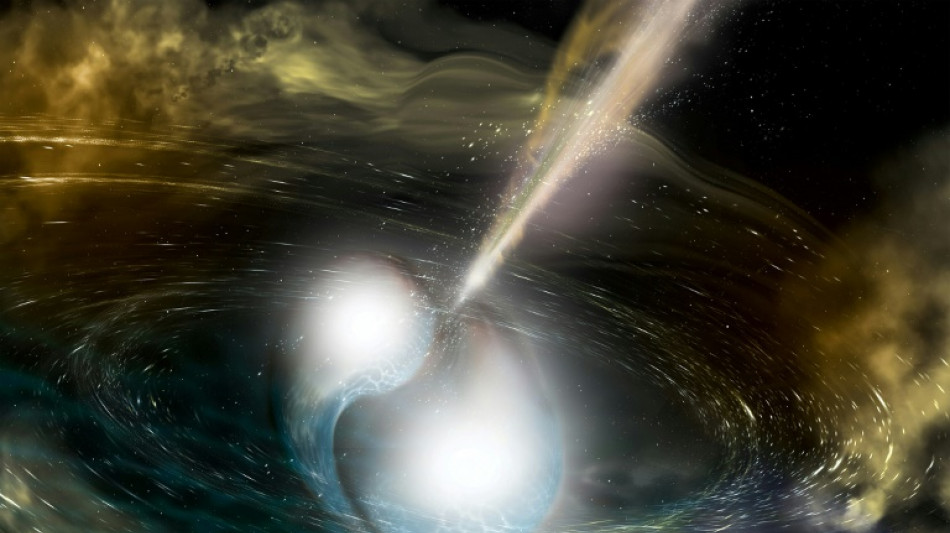
-
 Veteran Monfils exits to standing ovation on Australian Open farewell
Veteran Monfils exits to standing ovation on Australian Open farewell
-
Precision-serving former finalist Rybakina powers on in Melbourne

-
 South Korea's women footballers threaten boycott over conditions
South Korea's women footballers threaten boycott over conditions
-
Equities sink, gold and silver hit records as Greenland fears mount
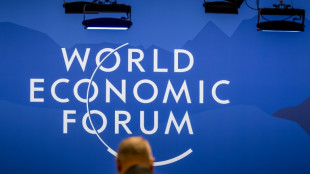
-
 Australian lawmakers back stricter gun, hate crime laws
Australian lawmakers back stricter gun, hate crime laws
-
EU wants to keep Chinese suppliers out of critical infrastructure

-
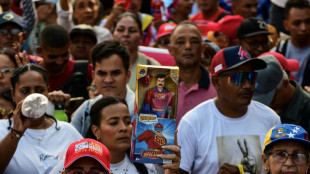 AI reshaping the battle over the narrative of Maduro's US capture
AI reshaping the battle over the narrative of Maduro's US capture
-
Penguins bring forward breeding season as Antarctica warms: study

-
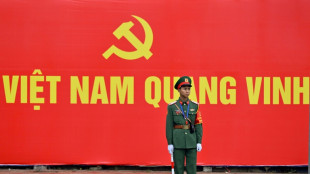 Vietnam leader pledges graft fight as he eyes China-style powers
Vietnam leader pledges graft fight as he eyes China-style powers
-
Ukrainian makes soldier dad's 'dream come true' at Australian Open

-
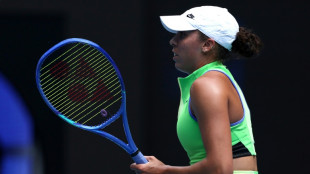 'Timid' Keys makes shaky start to Australian Open title defence
'Timid' Keys makes shaky start to Australian Open title defence
-
Indiana crowned college champions to complete fairytale season

-
 South Koreans go cuckoo for 'Dubai-style' cookies
South Koreans go cuckoo for 'Dubai-style' cookies
-
Harris leads Pistons past Celtics in thriller; Thunder bounce back

-
 Tjen first Indonesian to win at Australian Open in 28 years
Tjen first Indonesian to win at Australian Open in 28 years
-
Long-delayed decision due on Chinese mega-embassy in London

-
 Djokovic jokes that he wants slice of Alcaraz's winnings
Djokovic jokes that he wants slice of Alcaraz's winnings
-
Trump tariff threat 'poison' for Germany's fragile recovery

-
 Tourists hit record in Japan, despite plunge from China
Tourists hit record in Japan, despite plunge from China
-
Jittery Keys opens Melbourne defence as Sinner begins hat-trick quest

-
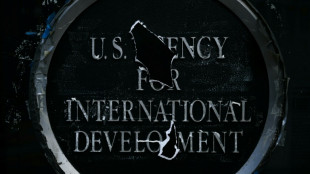 The impact of Trump's foreign aid cuts, one year on
The impact of Trump's foreign aid cuts, one year on
-
Belgian court weighs trial for ex-diplomat over Lumumba killing

-
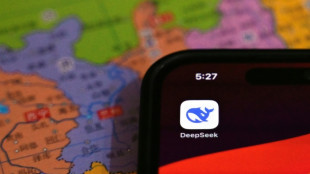 Inside China's buzzing AI scene year after DeepSeek shock
Inside China's buzzing AI scene year after DeepSeek shock
-
Asian markets sink, silver hits record as Greenland fears mount
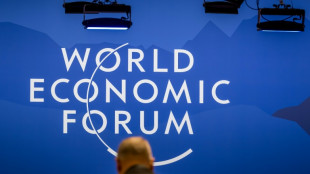
-
 Shark bites surfer in Australian state's fourth attack in 48 hours
Shark bites surfer in Australian state's fourth attack in 48 hours
-
North Korea's Kim sacks vice premier, rails against 'incompetence'
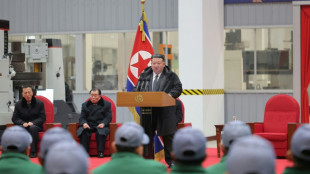
-
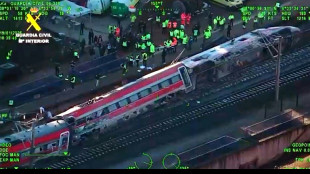 Spain mourns as train crash toll rises to 40
Spain mourns as train crash toll rises to 40
-
'Very nervous' Keys makes shaky start to Australian Open title defence
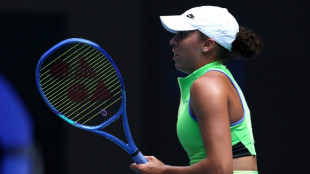
-
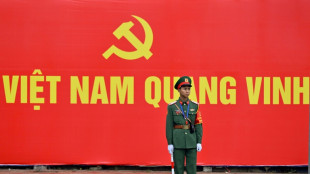 Vietnam leader promises graft fight as he eyes China-style powers
Vietnam leader promises graft fight as he eyes China-style powers
-
Dad-to-be Ruud ready to walk away from Australian Open

-
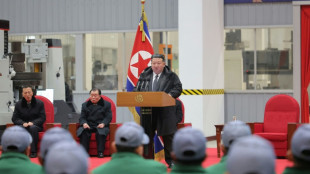 North Korea's Kim sacks senior official, slams 'incompetence'
North Korea's Kim sacks senior official, slams 'incompetence'
-
Farewells, fresh faces at Men's Fashion Week in Paris

-
 'I do not want to reconcile with my family' says Brooklyn Peltz Beckham
'I do not want to reconcile with my family' says Brooklyn Peltz Beckham
-
EU leaders take stage in Davos as Trump rocks global order

-
 Blast at Chinese restaurant in Kabul kills 7
Blast at Chinese restaurant in Kabul kills 7
-
Warner hits 'Sinners' and 'One Battle' tipped for Oscar nominations

-
 Colombian paramilitary-turned-peace-envoy sentenced over atrocities
Colombian paramilitary-turned-peace-envoy sentenced over atrocities
-
Gilgeous-Alexander leads Thunder in rout of Cavaliers

-
 Seahawks blow as Charbonnet ruled out for rest of season
Seahawks blow as Charbonnet ruled out for rest of season
-
Kostoulas stunner rescues Brighton draw after penalty row

-
 Man Utd greats tell Martinez to 'grow up' as feud rumbles on
Man Utd greats tell Martinez to 'grow up' as feud rumbles on
-
LeBron James' All-Star streak over as starters named

-
 Allies tepid on Trump 'peace board' with $1bn permanent member fee
Allies tepid on Trump 'peace board' with $1bn permanent member fee
-
Ninth policeman dies in Guatemala gang riots, attacks

-
 Man City's Foden to play through pain of broken hand
Man City's Foden to play through pain of broken hand
-
Milan Fashion Week showcases precision in uncertain times

-
 Public media in Europe under unprecedented strain
Public media in Europe under unprecedented strain
-
Africa Cup of Nations refereeing gets a red card

-
 Tributes pour in after death of Italian designer Valentino
Tributes pour in after death of Italian designer Valentino
-
Bills fire coach McDermott after playoff exit: team


China, France to launch satellite to better understand the universe
A French-Chinese satellite will blast off Saturday on a hunt for the mightiest explosions in the universe, in a notable example of cooperation between a Western power and the Asian giant.
Developed by engineers from both countries, the Space Variable Objects Monitor (SVOM) will seek out gamma-ray bursts, the light from which has travelled billions of light years to reach Earth.
The 930-kilogram satellite carrying four instruments -- two French, two Chinese -- will lift off aboard a Chinese Long March 2-C rocket from a space base in Xichang, in the southwestern province of Sichuan.
Gamma-ray bursts generally occur after the explosion of huge stars -- those more than 20 times as big as the sun -- or the fusion of compact stars.
The extremely bright cosmic beams can give off a blast of energy equivalent to over a billion billion suns.
Observing them is like "looking back in time, as the light from these objects takes a long time to reach us", Ore Gottlieb, an astrophysicist at the Flatiron Institute's Center for Astrophysics in New York, told AFP.
- 'Several mysteries' -
The rays carry traces of the gas clouds and galaxies they pass through on their journey through space -- valuable data for better understanding the history and evolution of the universe.
"SVOM has the potential to unravel several mysteries in the field of (gamma-ray bursts), including detecting the most distant GRBs in the universe, which correspond to the earliest GRBs," Gottlieb said.
The most distant bursts identified to date were produced just 630 million years after the Big Bang -- five percent of the current age of the universe.
"We are... interested in gamma-ray bursts for their own sake, because they are very extreme cosmic explosions which allow us to better understand the death of certain stars," said Frederic Daigne, an astrophysicist at the Institut d'Astrophysique de Paris.
"All of this data makes it possible to test the laws of physics with phenomena that are impossible to reproduce in the laboratory on Earth."
Once analysed, the data could help to better understand the composition of space, the dynamics of gas clouds or other galaxies.
The project stems from a partnership between the French and Chinese space agencies as well as other scientific and technical groups from both nations.
Space cooperation at this level between the West and China is fairly uncommon, especially since the United States banned all collaboration between NASA and Beijing in 2011.
- Race against time -
"US concerns on technology transfer have inhibited US allies from collaborating with the Chinese very much, but it does happen occasionally," said Jonathan McDowell, an astronomer at the Harvard-Smithsonian Center for Astrophysics in the United States.
In 2018, China and France jointly launched CFOSAT, an oceanographic satellite mainly used in marine meteorology.
And several European countries have taken part in China's Chang'e lunar exploration programme.
So while SVOM is "by no means unique", it remains "significant" in the context of space collaboration between China and the West, said McDowell.
Once in orbit 625 kilometres (388 miles) above the Earth, the satellite will send its data back to observatories.
The main challenge is that gamma-ray bursts are extremely brief, leaving scientists in a race against time to gather information.
Once it detects a burst, SVOM will send an alert to a team on duty around the clock.
Within five minutes, they will have to rev up a network of telescopes on the ground that will align precisely with the axis of the burst's source to make more detailed observations.
C.Koch--VB



